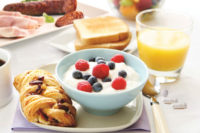During the same period, researchers project that the tax would mean 867,000 fewer obese adults between 25 and 64 years old, resulting in 95,000 fewer cases of coronary heart disease, 8,000 fewer strokes and 26,000 fewer premature deaths. New cases of type 2 diabetes would be reduced by 2.6% as more people opted for milk, juice, water and other beverages, the study said.
"The [study] shows that even modest reductions in sugar-sweetened beverage consumption could prevent thousands of cases of cardiovascular disease and diabetes, and save billions of dollars in medical costs," said James S. Marks, MD, MPH, senior vice president and director of the Robert Wood Johnson Foundation Health Group, which helped fund the study with the American Heart Assn.
Forty states have sales taxes on soda, but they are too low to impact sales, said Dr. Y. Claire Wang, lead study author and assistant professor at Columbia University's Mailman School of Public Health in New York. California's tax is the highest at 7.3%. In many states, profits from the taxes are used to benefit health-related programs and low-income families.
"This has been on the political agenda in a lot of state legislatures over the last few years," she said.
Unlike state sales taxes, an excise tax on beverage makers would affect the price on the front end, rather than at the cash register after the consumer has made the decision to purchase the product, Dr. Wang said.
Americans Against Food Taxes opposes such taxes, saying the country cannot tax its way to good health. "A tax on juice drinks and soda would further squeeze hardworking families already struggling to pay their bills and keep their health coverage," Susan Neely, president and CEO of the American Beverage Assn., said in a statement on the Americans Against Food Taxes website. "With the economic downturn, there could not be a worse time to ask them to pay more for the simple pleasures they enjoy."
The organization -- a coalition of concerned citizens, beverage and food manufacturers, grocers associations, restaurant chains and other businesses -- did not respond to requests for comments on the Health Affairs study.
Getting an excise tax on sugar-sweetened beverages passed at the national level would be difficult, Dr. Wang said. The beverage industry spent nearly $13 million to oppose an excise tax on sugar-sweetened beverages in New York state in 2010. But Dr. Wang said she thinks public sentiment may be shifting as more people learn about the nation's high health care costs.
"Eventually, the public needs to see which part [of the debate] is to protect profit and which part is what policymakers should be paying attention to," she said.
From the January 24, 2012, Prepared Foods' Daily News.







